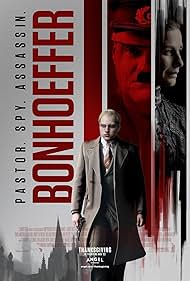As the world teeters on the brink of annihilation, Dietrich Bonhoeffer joins a deadly conspiracy to assassinate Hitler, risking his faith and his fate to save millions of Jews from genocide. Niemoeller’s actor August Diehl previously played a Gestapo SS officer in Inglourious Basterds (2009) and a German citizen who resisted conscription into the German army in A Hidden Life (2019). Dietrich Bonhoeffer: Against stupidity we have no defense. Neither protest nor force can touch it. Reasoning is useless. Facts that contradict personal prejudices can simply be discredited—indeed, the idiot can retaliate by criticizing them, and if they are undeniable, they can simply be dismissed as trivial exceptions. Well-shot and well-acted. However, the film devoted an inordinate amount of time to Bonhoeffer’s trip to New York in 1930 and his alleged fascination with gospel music and jazz. Indeed, his later prison letters reveal the lasting influence of traditional Lutheran chorales and the hymns of Paul Gerhardt on his theology and piety. There is no mention of his engagement to Maria von Wedemeyer (eighteen years his junior), with whom he exchanged dozens of letters during his imprisonment (1943–45), which were later published under the title “Love Letters from Cell 92.” It was Maria’s grandmother who financed the Confessing Church seminary in Finkenwalde, where Bonhoeffer advocated a kind of “new monasticism” for seminarians—with traditional chorales and ordered prayer of the psalms. A plot that linked Maria to the end of Bonhoeffer’s life would raise compelling questions—such as: Why get engaged if his/her world is about to end? That said, it is a good thing that a film about Bonhoeffer has been made, bringing his story of struggle for truth to a wider audience.






 22/36
22/36